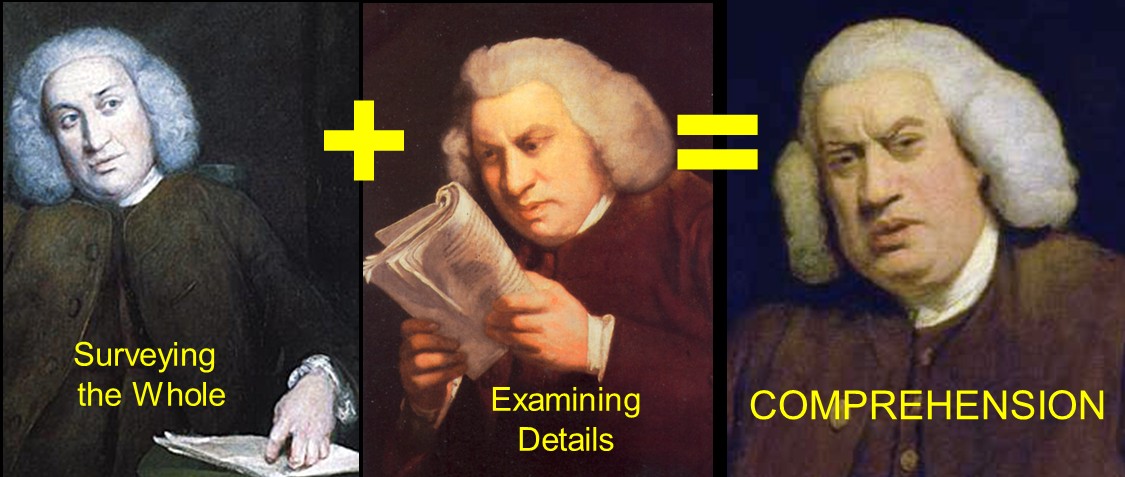 Samuel Johnson gives some excellent advice in his Preface to Shakespeare (1765) that applies to reading in general, and especially well to Bible reading. Johnson advises readers to plow straight through a Shakespeare play, keeping up a good pace even when passages aren’t clear. To slow down and investigate the unclear passages more carefully would be to lose the momentum and lapse out of the literary flow.
Samuel Johnson gives some excellent advice in his Preface to Shakespeare (1765) that applies to reading in general, and especially well to Bible reading. Johnson advises readers to plow straight through a Shakespeare play, keeping up a good pace even when passages aren’t clear. To slow down and investigate the unclear passages more carefully would be to lose the momentum and lapse out of the literary flow.
And above all, Johnson warned, don’t check the footnotes! Commentators are inevitably offering you help with details (glosses, etymologies, textual emendations, cultural context, explanations of allusions), but before you need details, you need to experience the whole. Read on, read on:
Let him read on through brightness and obscurity, through integrity and corruption; let him preserve his comprehension of the dialogue and his interest in the fable. and when the pleasures of novelty have ceased, let him attempt exactness, and read the commentators.
“Notes are necessary,” says Johnson, “but they are necessary evils.” They provide valuable clarification, but “the general effect of the work is weakened” because “the mind is refrigerated by interruption.”
I take Johnson to be making two major points. The first is about the experience of the reader, who can only grasp the book’s complete flow by committing to experiencing it in sequence, page by page, steadily. Stopping at every bit that needs to be clarified will in fact add knowledge of the bits and pieces, but inevitably robs you of the flow. And in many forms of literature, what you get from the flowing experience is what makes the detailed knowledge worth pursuing. The plot carries you along, or the character development, or (in non-fiction) the intellectual unfolding of an idea or progress of an argument and its entailments.
The second point can be put more philosophically: meaning comes from the whole and informs each part. No individual bit, no matter how much you clarify it, can in isolation deliver the work’s meaning. Johnson is explicit about this in his Preface:
Parts are not to be examined til the whole has been surveyed. There is a kind of intellectual remoteness necessary for the comprehension of any great work in its full design and its true proportions; a close approach shows the smaller niceties, but the beauty of the whole is discerned no longer.
The ideal way to work out this part-whole dialectic is, I suppose it’s obvious, to read and re-read the text. Once you have achieved the “intellectual remoteness” of having the entire work in your mind’s eye, you can then investigate whichever “smaller niceties” seem most important or interesting. That was Johnson’s plan with Shakespeare, and it also makes sense as a plan for Bible reading.